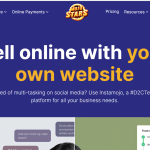Introduction.
Selling ebooks on Facebook is a smart and increasingly popular way to reach readers directly where they’re already spending their time.
With over 2.9 billion active users worldwide, Facebook offers a unique platform to engage with your target audience, build a following, and turn that interest into sales.
If you’re an author or just looking to sell digital content, leveraging Facebook’s reach could open new avenues for your ebook sales.
In this article, I’ll walk through everything you need to know about selling ebooks on Facebook.
Why Sell Ebooks on Facebook?
Facebook is much more than a social network; it’s a dynamic platform with powerful tools to promote and sell products. Here are a few reasons why Facebook is worth considering for ebook sales:
- Massive User Base: Facebook has billions of active users, with people of all ages and interests.
- Advanced Targeting Options: Facebook’s advertising tools allow highly specific targeting, helping you reach people who are most likely to buy your ebook.
- Community Engagement: Through Facebook Groups, Pages, and Messenger, it’s easy to create a sense of community and engage directly with readers.
How Do I Sell Ebooks On Facebook?
Here’s a comprehensive look at how to set up and successfully sell your ebook on Facebook:
Step 1: Set Up Your Facebook Business Page
If you don’t already have a Facebook Business Page, start by setting one up. This will be your main platform to promote and sell your ebook. Follow these steps:
- Go to Facebook’s Create Page option.
- Select “Business or Brand” and follow the prompts.
- Add a profile picture, cover photo, and any relevant details about yourself or your brand.
- Use the “About” section to describe what your ebook is about, who it’s for, and why people should buy it.
Step 2: Create Content That Drives Interest
Content is key to grabbing attention and converting it into sales. Here are some content ideas that can help:
- Teasers and Previews: Share small sections or snippets from your ebook. This gives readers a taste and can generate curiosity.
- Engaging Posts: Use images, videos, or graphics that relate to your ebook’s topic. Videos and infographics are especially effective.
- Customer Testimonials: Positive feedback from past readers or reviewers can boost credibility and encourage others to buy.
Step 3: Use Facebook Shops and Paid Ads
Facebook Shops allows users to set up an online store directly within the platform, which is ideal for selling digital products like ebooks. Here’s how to use it:
- Set Up Facebook Shops: Navigate to Facebook Commerce Manager, where you can create a store and add your ebook as a product.
- Use Paid Ads: Facebook Ads can increase your reach significantly. Use Facebook’s targeting features to reach specific groups, whether it’s by age, interests, location, or behaviors. This way, you’re reaching people more likely to be interested in your ebook.
Step 4: Promote Through Facebook Groups and Messenger
Facebook Groups and Messenger are powerful tools for building relationships and directly engaging with your audience.
- Join Relevant Groups: Find groups where your potential readers are active and participate genuinely. Avoid spamming, but don’t be shy about sharing helpful insights from your ebook.
- Use Messenger for Direct Sales: Set up automated messages with a “Buy Now” link, or answer questions to move readers from interest to purchase.
Effective Marketing Strategies for Selling Ebooks on Facebook
- Create a Sales Funnel: Use a mix of Facebook Ads and posts to guide readers from awareness to purchase. For instance, run an ad to gather email addresses, then follow up with a targeted email campaign.
- Run Giveaways or Contests: Offer a free copy or a discount to a lucky winner to generate buzz. Contests encourage sharing, which can attract new audiences.
- Offer Discounts and Time-Limited Promotions: People are more likely to buy if they feel they’re getting a deal or a limited-time offer.
- Leverage User-Generated Content: Encourage readers to share photos of themselves with your ebook and tag your page. This form of social proof is invaluable.
Pros and Cons of Selling Ebooks on Facebook
Pros
- Wide Audience Reach: With billions of users, Facebook is one of the largest marketplaces available.
- Cost-Effective Advertising: Facebook’s advertising options allow you to set flexible budgets, so you don’t have to spend a fortune to see results.
- Direct Engagement: Facebook allows for easy communication with readers through comments, posts, and Messenger, helping build trust and loyalty.
Cons
- High Competition: Because of Facebook’s popularity, many are using it to sell products, including ebooks, which can make it challenging to stand out.
- Algorithm Changes: Facebook frequently updates its algorithm, which can affect organic reach. You may need to invest in ads for visibility.
- Platform Dependence: Relying solely on Facebook could be risky if the platform changes its policies or audience behavior shifts.
Conclusion
Selling ebooks on Facebook offers a powerful way to reach a global audience and connect directly with potential readers.
By using a mix of organic posts, ads, and engaging content, you can create a successful sales strategy.
There may be challenges, especially with competition and platform changes, but with a solid plan, it’s possible to build a steady stream of sales through Facebook.
Are you ready to start selling your ebook on Facebook, or are there some challenges holding you back?





Thanks for the article. It’s helpful for me.
Thanks for stopping buy too, I appreciate
Awesome article. Just the inspiration I needed. Thank you for break down.
Thanks!!